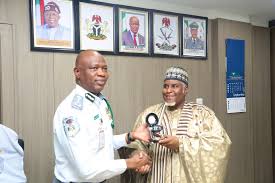By Stephen Ubanna
Nigeria has joined other international global maritime nations to commemorate the World Maritime Day, today, WMD, slated for today, September 30th, 2025. Anthonio Guterres, United Nation’s Secretary General and Aresenio Dminguez, his counterpart, in the International Maritime Organisation, IMO, had said that the theme for this year’s celebration is: Our Ocean, Our Obligation and Our Opportunity.
Speaking on the Theme, Guterres, the UN, Secretary General, had said that it gives an insight of the essential role ’’the ocean plays in sustaining life, livelihoods, and the global economy’’. He had pointed out in his speech that the ‘’ocean provides half of the oxygen we breathe, feeds billions of people, regulates the climate and enables more than 80% of global trade through maritime transport just as ‘’it is a home to countless marine species and vital source of jobs, food and economic opportunity for millions of people all over the world’’. He did not stop there.
He was said to have further disclosed that the ocean also spotlights ‘’deep interconnection between shipping and broader global initiatives’’, particular, the UN Sustainable Development Goals, SDGs, He was emphatic that the 2025, WMD, Theme for discussion is closely tied to SDG 14: life below water, which focuses on conserving and sustainably using marine resources.

He had asserted that the 2025, WMD Theme, also connects to SDG 13, Climate Action, SDG 9, Industry, Innovation, Infrastructure and SDG 17, which has to do with partnership for the realization of the goals. He had alluded to the fact that the adoption of the 2023 IMO Greenhouse Strategy marked’’ a milestone in charting a course toward net-zero emissions from shipping by 2050.
His major worry was that ‘’the ocean faces mounting pressure from pollution and overuse to the accelerating effects of climate change’’ stressing that ‘’protecting it is not about saving nature but a global responsibility that touches every aspect of human life.
Dominguez, Secretary General of IMO, on his part had warned of’’ other human -induced pressures such as, global warming, acidification,overfishing, and placing marine ecosystems under severe rain
Guterres, the UN, helmsman, had recalled that the largest sector in the ocean space is the shipping industry which plays a crucial role’’ in facilitating global trade and advancing ocean protection’’, stressing that ‘’it works hand in hand with other sectors of the global economy like tourism, fisheries and marine research to manage ocean sustainably’’.
The UN, Secretary General, who could not hide his feelings had confirmed that the IMO, had developed regulatory frameworks and technical assistance programmes for its 176 members and had continued ‘’to lead efforts for cleaner and safer seas’’, insisting that the world relies on safe, secure and efficient international shipping industry described as an essential component of any programme for future sustainable green economic growth in sustainable manner.
Given that the promotion of sustainable shipping and sustainable maritime development is one the major priorities of the IMO, in the coming years, may have informed why he had declared that it would go a long way ‘’to encourage energy efficiency; new technology and innovation; maritime education and training; maritime security maritime traffic management and the development of maritime infrastructure.
He noted that the development and implementation of global standards covering these and other issues will underpin the UN maritime agency ‘s commitment ‘’to provide the institutional framework necessary for green and sustainable global maritime transportation system.

Dminguez, the IMO boss, who had corroborated the claims of the UN, Secretary General about the ocean, had alluded to ‘’its essential role in regulating the climate, sustaining life and supporting global commerce’’ He had reflected the ocean’s vital role in the global economy with more than 80% of maritime trade inspired by sea.
The IMO, Secretary General, may have gladdened the heart of the Organisation 176 member nations when he confirmed that over many decades, the Organisation has developed and adopted mandatory rules, recommendations and guidelines to protect the global marine environment from potential negative impact of shipping.
He had made reference to the binding treaties applied on ocean going vessel laden-with cargoes globally. These treaties, he had said includes the International Convention for the Prevention of Pollution of Ships, MARPOL, first adopted in 1973. The treaty, according to the IMO, Secretary General, cover pollution from oil, dangerous chemicals, packaged goods, sewage and garbage, and harmful emissions from ships.
Other marine-related treaties which the IMO Secretary General had said had been developed cover the dumping of wastes at sea, regulated by the London Convention and Protocol; managing ships’ ballast water to prevent the spread of potentially invasive aquatic species, regulated by Ballast Water Management Convention. This is in addition to the anti-fouling systems, preparedness and response for spills of oil or chemicals in the high sea.
He had revealed that these international invasive aquatic species released into the sea through ballast water and biofouling regulations which had been developed by the IMO, over the years, are supported by technical assistance programmes and projects from member states to tackle specific challenges such as marine plastic litter, greenhouse gas emissions from ships and the spread of invasive aquatic species.
Lami Tumaka, Chairman of the Mobilization and Publicity Sub-committee in Nigeria appears to have done the necessary ground work to ensure a successful celebration of the WMD, in Nigeria, by Adegboyega Oyetola, a former governor of Osun state and now minister of marine and economy ministry, under the present Administration of President Bola Ahmed Tinubu, and the maritime stakeholders.
The minister had taken advantage of the WMD, event, in Lagos, the nation’s commercial nerve-centre, to have emphasized ‘’the need for stronger collaboration between the citizenry and the Federal Government ‘’to harness the vast opportunities within Nigerian maritime domain’’.
He was said to have also stressed the need for urgent global maritime cooperation, stressing that such cooperation is required ‘’to reduce pollution of the ocean, protect maritime life and adopt sustainable practices.







